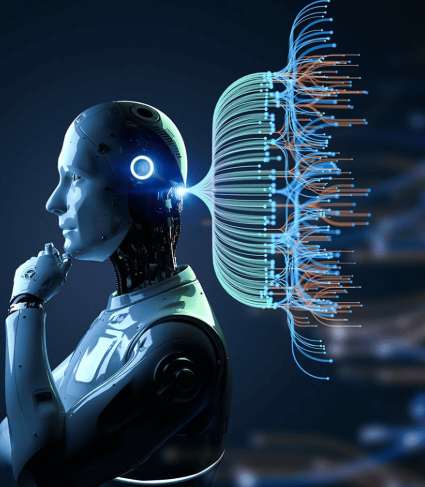How AI Is Transforming the Future of Management Consulting
- 255 Views
- admin
- 02/15/2025
- Artificial Intelligence
Artificial intelligence is reshaping industries across the globe, and management consulting is no exception. In recent years, the integration of AI tools and techniques into consulting practices has enabled firms to deliver deeper insights, faster results, and more strategic outcomes. Businesses are increasingly turning to AI-powered consulting to stay competitive in a landscape that demands agility, precision, and innovation.
The Growing Importance of AI in Consulting Services
As organizations embrace digital transformation, the need for expert guidance on implementing and leveraging AI has surged. Companies are no longer just experimenting with AI—they are actively embedding it into core operations. To do this effectively, they seek consultants who can identify the right AI solutions, evaluate data readiness, and navigate implementation challenges.
AI consulting isn’t just about installing new software. It involves crafting tailored strategies that align with business goals, integrating AI into existing workflows, and ensuring teams are prepared to adapt. The growing complexity of AI technologies, combined with limited in-house expertise, makes external consultants an invaluable resource for bridging the gap between ambition and execution.
How AI Is Shaping the Consulting Process
The introduction of AI into management consulting has revolutionized how consultants operate. Complex data analysis, once a time-consuming task, is now accomplished swiftly through machine learning algorithms. This speed and accuracy empower consultants to focus on delivering strategic guidance and creative solutions rather than spending hours on manual data interpretation.
With the help of AI, consultants can identify market trends, forecast performance, and simulate outcomes with impressive accuracy. These capabilities are especially useful when creating business models, managing change, or making investment decisions. AI also enhances personalization, enabling consultants to develop client-specific strategies based on data-driven insights.
Modern Tools Redefining Consulting Efficiency
AI-driven platforms are offering consultants a powerful toolkit to elevate client services. From customer relationship management systems to natural language processing tools, these technologies enable a more responsive and insightful consulting process.
For example, AI can automate reporting and documentation, saving time and ensuring consistency. It can also assist in sentiment analysis, helping consultants better understand client concerns and tailor their communication accordingly. Additionally, smart project management tools equipped with AI can allocate resources effectively, manage timelines, and mitigate potential risks—all in real time.
Balancing AI and Human Expertise
Despite AI’s impressive capabilities, it cannot replace the depth of human understanding in complex business environments. While algorithms can process vast data sets and generate logical solutions, they lack the emotional intelligence, cultural awareness, and ethical judgment that human consultants bring to the table.
Effective consulting often requires navigating sensitive organizational dynamics, managing change among stakeholders, and fostering trust—areas where human skills remain essential. AI serves best as a complement to consultants, handling analysis and automation so that professionals can focus on strategic leadership and client relationships.
Changing the Face of Business Management
AI is also influencing broader business management beyond consulting engagements. Organizations are using AI to refine operations, predict consumer behavior, and enhance supply chain efficiency. These improvements are not just technical—they impact productivity, decision-making, and long-term planning.
Executives now rely on AI-enabled dashboards to monitor performance and adjust strategies on the fly. Machine learning models can uncover inefficiencies, recommend cost-saving measures, and even suggest new business opportunities. As a result, management decisions are becoming more agile and informed, leading to stronger outcomes across departments.
Unlocking Innovation Through AI Applications
Generative AI and other advanced technologies are opening new doors for creativity and growth. In consulting, these tools are helping develop innovative products and services, model potential market disruptions, and identify untapped areas of value.
AI applications are also empowering solo consultants and smaller firms. Access to scalable analytics tools levels the playing field, allowing these professionals to deliver insights once exclusive to major firms. As AI continues to evolve, it is enabling a more inclusive and diverse consulting ecosystem.
The Future of Consulting in the AI Era
As we look ahead, it’s clear that AI will become a permanent fixture in management consulting. The role of the consultant is shifting—from data interpreter to strategic advisor. Firms that embrace AI not just as a tool but as a core component of their business model will lead the industry into a new chapter of innovation and growth.
However, this future requires ongoing adaptation. Consultants must stay updated on technological advancements, develop hybrid skill sets, and maintain a strong human-centric approach. Those who can blend technical fluency with emotional intelligence will be best positioned to thrive.
Conclusion
Artificial intelligence is redefining what’s possible in management consulting. From accelerating data analysis to guiding strategic transformation, AI tools are reshaping how consultants deliver value. Yet, the essence of consulting—trust, insight, and partnership—remains grounded in human connection.
Rather than replacing consultants, AI enhances their impact. The firms and professionals that learn to integrate AI effectively into their practice will not only meet client expectations—they’ll exceed them. As the consulting landscape evolves, those who embrace this synergy of technology and expertise will lead the way into a smarter, more responsive future.
Recent Posts
- How AI is Revolutionizing Architectural Design: A Look at Tools, Trends, and the Future
- Streamlining Cyber Risk Assessments Through Automation
- Understanding the Difference Between Blockchain and Distributed Ledger Technology
- Is Bitcoin Mining Still a Viable Venture in 2025?
- Exploring AI: Unveiling Possibilities, Challenges, and Future Implications

